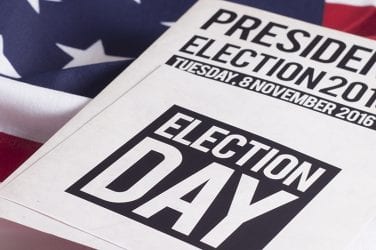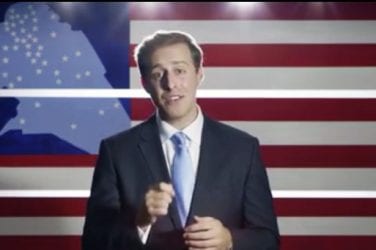I’ve had a podcast called the Create Your Own Life Show since November of 2015. Since launch, a lot has happened: in my first 30 days I was downloaded 10,000 times, featured in big press like Forbes and INC, named a top podcast to follow two years running by CIO Magazine and passed 1 million downloads.
I’ve also gotten a chance to interview many of my heroes, such as former NFL All Pro Shawne Merriman, nine-figure entrepreneur Grant Cardone, Legendary Hip Hop DJ Kid Capri and NY Times Bestselling author Seth Godin.
I’ve also gotten to speak on stages like Podfest Multimedia Expo and Outlier Podcast Festival.
My podcast has also led to the creating of my company Command Your Brand Media in 2016, a PR firm for the podcast industry.
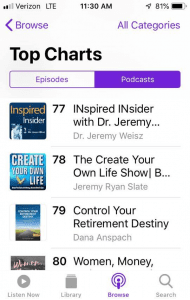 I don’t say all this to impress you, but rather to show how important my podcast is to my life and livelihood. On Saturday October 20th we hit our highest ranking since the show started: # 78 in Apple Podcasts’ overall top 200 ranking.
I don’t say all this to impress you, but rather to show how important my podcast is to my life and livelihood. On Saturday October 20th we hit our highest ranking since the show started: # 78 in Apple Podcasts’ overall top 200 ranking.
I was very excited to screenshot it, but since I was in New York City running an event, I would wait until Sunday to promote it.
I woke up Sunday morning and a heart attack ensued, my podcast was not listed in iTunes or Apple Podcasts.
I logged into Apple Podcast Connect, Apple’s platform for managing your podcast feed, and my show feed was listed as “Rejected.” Podcast connect also said that in order to handle the problem I had to contact Apple.
I’d always played the game by the book, or so I thought, so my show being rejected scared me for the ramifications that it could create.
The scarier thing, was that I received no notification from Apple that my podcast had broken terms of service. One thing that came to mind is that many of my podcast friends had seen issues with their podcasts being rejected recently.
I got kicked out of iTunes for 24 hours, here's what I learned and how you can avoid it too
Posted by Jeremy Ryan Slate on Tuesday, October 23, 2018
Gregg Clunis, host of the Tiny Leaps, Big Changes Podcast, recently had his podcast rejected for having too many keywords in his title line and description, an issue called “keyword stuffing.” Once Gregg removed the issue, too many keywords in his iTunes listing, his show was quickly reinstated.
With Gregg’s experience in mind, my freak out was lessened a little bit. I quickly wrote an email to Apple Support and went through my podcast feed and looked at things I knew could be wrong.
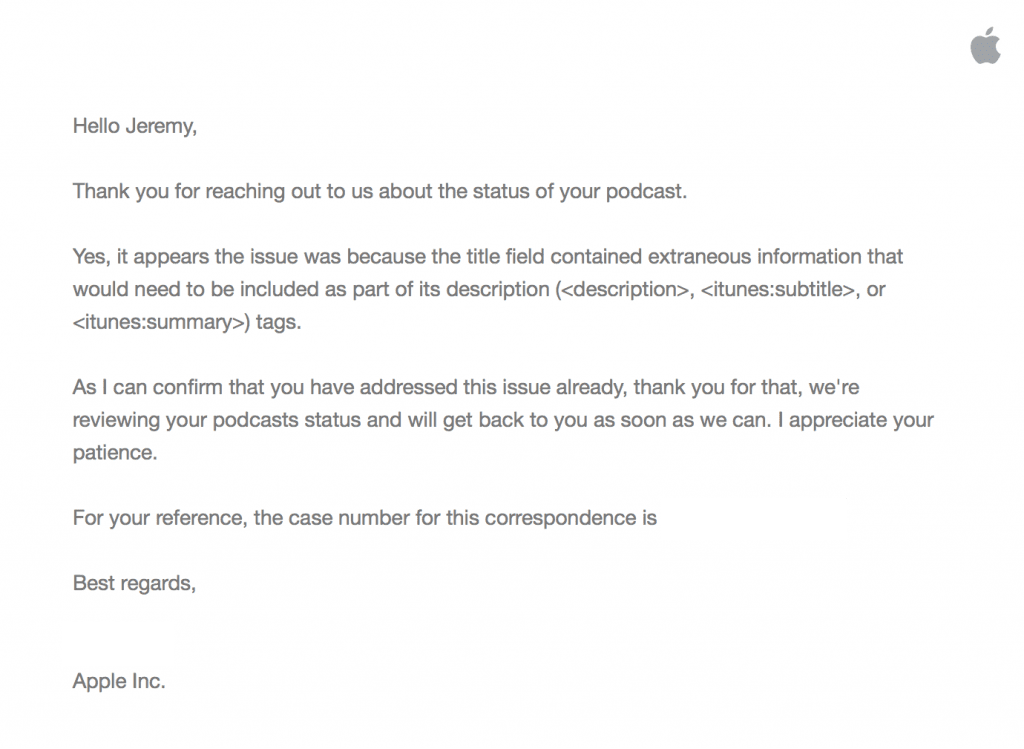 My show title was VERY long and included my subtitle, I shorted it to only my title.
My show title was VERY long and included my subtitle, I shorted it to only my title.
Apple has also really cracked down on profanity in show titles, and so I looked at anything that could remotely be considered profanity and removed it.
As well as profanity in written form, Apple is also cracking down on profanity in spoken form. All episodes that have profanity must be marked as so, or you risk removal from iTunes.
For the most part, I have done a pretty good job marking individual episodes as explicit, but out of concern that I may have missed one, I marked my whole feed explicit.
Late in the day on Sunday, I received an email from Apple Support and it appears that the title of my show was the issue. Luckily in the same email, they could confirm that I had already fixed the problem.
My title had been in that format for 3 years, but under iTunes greater scrutiny, it would no longer get by. So, how did it happen? It could just be coincidence, but my thought is that the greater visibility showed someone at Apple HQ that I was breaking terms of service.
Lucky for me, the fix was an easy one and by mid-day Monday my show was restored; crisis averted.
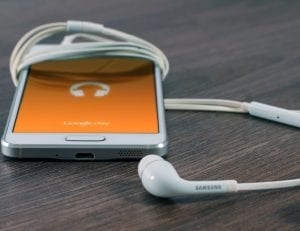 iTunes is just one platform, so why is being removed from it equivalent to an apocalypse?
iTunes is just one platform, so why is being removed from it equivalent to an apocalypse?
According to VP of Podcaster Relations at the podcast host Libsyn, Rob Walch, 62.8% of all podcasts are downloaded in either iTunes or Apple Podcasts, second place is Spotify with only 6.8% of all downloads.
The remaining percentage of downloads are split between many other podcast listening apps (many of which pull their feeds from iTunes), including Overcast, Castbox and a myriad of others.
Given the state of podcast traffic, being removed from iTunes and Apple Podcasts is a very scary thought.
This is warning to not become platform dependent, one of the reasons for 11 year podcast veteran, Dov Baron’s success. Baron makes sure that his content is in many places: his website, Spotify, iHeart Radio and even including terrestrial radio.
The moral of the story? Know your terms of service and follow them. However, beyond that, build a podcast show that is not dependent upon a single platform. Only then, can you protect yourself from whatever may happen.




